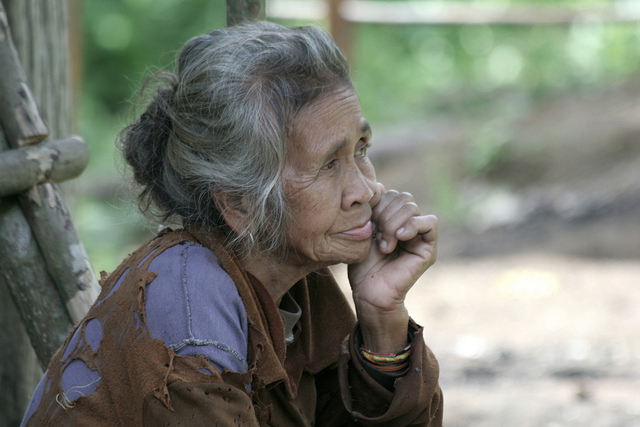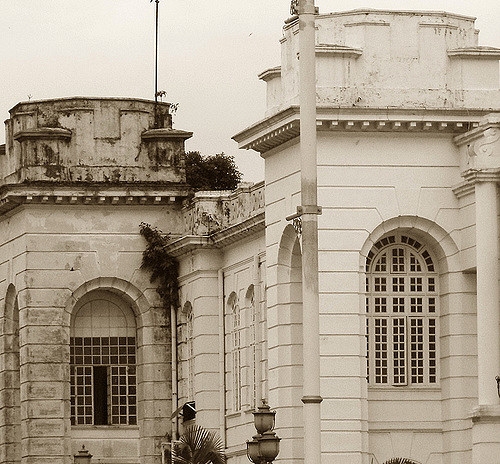Protests by the Semai over the construction of a hydroelectric dam that is destroying their forests, waters, and livelihoods have been increasing over the past couple of months. Numerous news sources in Malaysia have been covering the developments in six Orang Asli villages located in the town of Gopeng, in Perak State.

A news story on February 21, 2018, reported the official line, that a proposed dam on the Geruntum River, which flows through forested hills a few miles east of the Gopeng town center, was needed in order for Malaysia to increase its sustainable development and to fulfill its commitments under the Kyoto Protocol to reduce its greenhouse gas emissions. The Menteri Besar (Chief Minister) of Perak, Seri Zambry Abdul Kadir, told reporters who were investigating the growing protests by the Semai that he had instructed some of his executive counselors to take another look at the study that had launched the dam construction project.
On February 13, more than 200 Orang Asli people from the six villages gathered at the dam construction site, along with representatives from three different outdoor adventure companies, to peacefully air their complaints. The Semai alleged that they had not been consulted about the project. Some of the graves of their ancestors had already been destroyed as well as some of the surrounding forest lands. When Mr. Zambry was asked by reporters how the government would react to the protests, he obfuscated by replying “I do not know what is going on. Do not ask me about the technicalities.”

The proposed dam not only endangers the Geruntum River, it also threatens the free flowing Sungai Kampar just downstream, which is one of the major whitewater rafting rivers in Malaysia. Another news story on March 1 reported that the Semai villagers had already lost half of their fruit tree plantations due to clearing operations along the banks of the river preparatory to the construction of the dam.
Uda Tiah, a 53-year old resident of the village of Sat Baru, said that construction crews had ignored pleas by the villagers to stop their work. “The contractor told us that the project is approved by the state government, but when we ask them to show the permission letter to clear the land, the contractor did not give us any,” he said. He indicated that the villagers had sent letters to government agencies and lodged reports with the police but nothing had been done to address their complaints.

Uda Tiah said that half of his durian orchard had been destroyed already by the bulldozers. He told the reporter that the durian grove is his only source of income. Replanting the trees was hardly a viable option since they take from one to two decades to mature before they start fruiting. Other plants destroyed by the bulldozers included petai (bitter beans), mangosteen langsat, and various cultivated herbs and roots.
Talip Baharun, a 44-year old from the same village, said that the contractor had fouled the river, which he and others rely on for their drinking water. He said that they don’t have piped in water, and that they rely on the river for its fish, which appear to be affected by the pollution. About 3 km of the river bank has been cleared by the construction crews. Tommi Arisian, a 31-year old, complained that the burial ground had been posted with signs saying, in essence, “Orang Asli customary land,” but the contractor destroyed the area anyway.
A reporter at the end of March interviewed a man named Uda Tiah, a 57-year old from the village of Kampung Sungai Ampang, who also complained about the destruction of their tree crops. “I know that it is government land. But the trees on the land were planted by us. They are our trees. They should at least respect us,” he said.

A different Orang Asli person in Gopeng made the same point, though more emphatically. “First, it’s our orchards, tomorrow they will come and bulldoze our houses,” said Bahagen Bahaden. “We who have lived here for generations have no rights and the government can just give the land to other developers.”
A Malaysian NGO called the Malaysian Natural Treasures Protection Association (PEKA) got involved in the issue, indicating the obvious, that the river is the primary source of water for the people and that they have valid concerns about their orchards and future livelihoods. The President of PEKA, Sajeeda Muhammad, urged the government to resolve the issue and prevent more pollution of the river. “Only the Menteri Besar now has the power to help,” she said.
She wasn’t counting on the resolve of the Semai to take matters into their own hands. A news story last week reported that they have taken the matter to court—to Perak’s High Court in the state administrative capital, Ipoh. Thirty five Orang Asli filed a suit against Malaysia’s federal government, the state government, plus four organizations over the infringement of their rights on 63 ha. of land, which they claim was cleared without their consent. They seek an injunction to prevent the government agencies and the contractors they name in their suit from encroaching any further on their lands and properties.

The attorney for the Semai, A. Sivanesan, said that almost 1,000 families in the six communities along the river had been affected by the land clearing work that had begun nearly three months ago. Sivanesan told reporters outside the courthouse that the Semai “are not against development but they have been staying on this land for over 400 years. They have special rights to this land which cannot be abandoned.” They are also seeking a declaration that they are the legal owners of the land that they have lived on for centuries. They want the governments involved to give them monetary compensation for the damages they have suffered.
Although Dentan reported in his classic 1968 book The Semai: A Nonviolent People of Malaya that the Semai preferred to flee into the forest if threatened by attackers in order to avoid confrontations, the attitudes in at least some of their villages have changed. A news report from 2015 described the willingness of a Semai community in Perak to take a private company to court for trespass when it invaded their traditional lands. Thus, the action last week by the Gopeng Semai is not surprising.